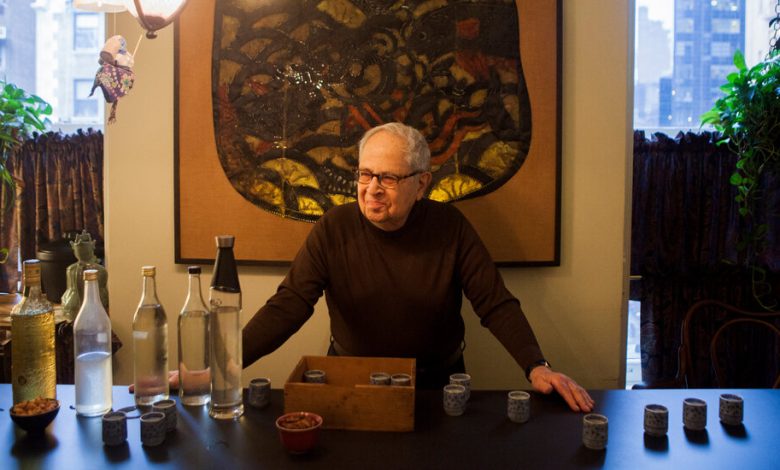Raising Our Glasses to a Pianist Who Loves Vodka

Good morning. It’s Friday. Today we’ll find out about the drink of choice at a party for the pianist Gary Graffman, who turns 95 tomorrow. We’ll also see why Gov. Kathy Hochul is threatening to impose fines on some hospitals.

Gary Graffman in his apartment in 2015.Credit…Sam Hodgson for The New York Times
The email was addressed to “all FOG.” It said that was short for “friends of Gary’s.”
It asked for R.S.V.P.s “to make sure Gary makes enough vodka.”
Gary — the pianist Gary Graffman — is not actually making the vodka for the party celebrating his 95th birthday on Saturday. He does not have a still in his apartment, or so he says.
He is merely making infusions for vodka, as he has for years, to add some taste to a distilled beverage that some consider flavorless. “My entire repertoire,” he said, “is lemon, lime, tangerine, pepper, ginger, horseradish and dill.”
As a pianist, Graffman was a child prodigy who had made his New York recital debut at age 10. As a young man, he played Tchaikovsky at the Hollywood Bowl and survived a tour that took him — “by some freakishly alliterative coincidence,” as he once put it — from Baden-Baden (in Germany) to Bora-Bora (in the Leeward Islands). “Short, pleasant, comfortably stooped and bespectacled, he lacks the craggy grandeur of a Rubinstein or even the gawky magnetism of Cliburn,” the critic John Rockwell wrote in The New York Times when Graffman was 44. “All he does is play the piano very well.”
But his performing career was interrupted in the 1970s when his right hand was impaired by a neurological disorder. He went on to play pieces written for the left hand. He published a memoir, “I Really Should Be Practicing,” when he was 53. From when he was 58 to when he was 78, he was the artistic director or president of the Curtis Institute of Music in Philadelphia, where his students included stars like Lang Lang and Yuja Wang.
Apparently he taught them about more than playing the piano, I wrote several years ago after spending an afternoon sampling his vodka infusions. He mentioned one former student who would stop by from time to time. “The door opens,” he said. “She doesn’t say, ‘I haven’t seen you for a while.’ She says, ‘Tangerine.’”
He did not name the tangerine enthusiast then, but when I called him this week to talk about the party and repeated that anecdote, he said, “That was Yuja.”
Then he began discussing different brands of vodka. “Ignat Solzhenitsyn” — a conductor and pianist and the son of the writer Aleksandr Solzhenitsyn — “said he lined up vodkas with his father, and they liked Ketel One,” Graffman said.
Oh, well. I remember buying a bottle of Tito’s Handmade Vodka on the way to Graffman’s apartment the afternoon he served infusion after infusion. I remember thinking when I handed it to him that it was a coals-to-Newcastle moment. I also remember saying I prefer gin.
He served me a lime infusion, saying that citrus-flavored vodkas brought back memories of his childhood: His parents were Russian émigrés — his father was a violinist who had been the concertmaster of the Minneapolis Symphony Orchestra (now the Minnesota Orchestra). “My parents always put lemon peels in the vodka bottles,” he said. “I was allowed to drink it at celebrations even though I was only 12 years old.”
Among the FOG, there are outliers.
“I was and am a scotch drinker,” said Mae-seen Loong, a Chinese art specialist who met Graffman on a trip to China in the fall of 1981 and who has helped to organize the Saturday gathering. “I had no idea who he was until Oct. 14, when someone on the trip listening to Canadian radio said the station was celebrating Gary Graffman’s birthday.”
Over the years, Graffman “kept presenting new and provocative flavors, like horseradish and eureka lemons,” she told me this week, “so I converted.”
On the Chinese calendar, this is the Year of the Rabbit. She sent Graffman a batch of carrots, imagining a new orange infusion. “Maybe,” he told me.
Next year will be the Year of the Dragon. There’s no word yet on what kind of fire-breathing infusion he might whip up.
Weather
Expect sunny skies with temperatures in the mid-60s. At night, expect partly cloudy skies with temperatures in the low 50s.
ALTERNATE-SIDE PARKING
In effect until Nov. 1 (All Saints Day).
The latest New York news
-
Columbia protest: Columbia University closed its campus to the public on Thursday in advance of competing pro-Israel and pro-Palestinian protests, and one day after a 24-year-old Israeli student was beaten in front of a library on campus.
-
Nonprofit fraud: Two men were arrested and charged with conspiring to defraud New York City of millions of dollars by channeling money from a nonprofit organization meant to house the homeless to companies that they secretly ran.
-
Bereket returns: A story as old as raising the rent: A beloved restaurant gets gentrified out of the neighborhood. But this time, somehow, it returns, nearly a decade later.
-
Social media legislation: New York State officials unveiled a bill to protect young people from potential mental health risks by prohibiting minors from accessing algorithm-based social media feeds unless they have permission from their parents.
-
U-malls: Gerald Ortiz, a style commerce writer at GQ who lives in Brooklyn, started organizing U-Mall events — sales of vintage items out of rented trucks — earlier this year, after his penchant for buying vintage clothes evolved to include buying vintage furniture during the pandemic.
-
What we’re watching: Two Metro reporters, Nicholas Fandos and Jeffery C. Mays, discuss local reactions to the attack on Israel, and the critic A.O. Scott discusses the joy of movies on “The New York Times Close Up With Sam Roberts.” Friday at 7:30 p.m., Saturday at 7:30 p.m. and Sunday at 7:30 p.m. [CUNY TV].
Hochul says some hospitals resist reopening psychiatric wards
As New York tries to move people with severe mental illness off the streets and into treatment, Gov. Kathy Hochul says some hospitals aren’t helping.
After saying “we have a moral obligation” to care for people struggling with mental illness, she threatened to fine several hospital systems unless they reopen psychiatric wards that were closed during the pandemic. She said those units were now needed to provide treatment to homeless people with severe mental illness.
“There will be fines if you don’t bring these back online, in the timetable we’re telling you,” Hochul said. “We’re done with excuses,” she said at another point during a news conference in Manhattan about steps her administration had taken to tackle mental illness.
Homeless mentally ill people have presented a problem for Hochul and Mayor Eric Adams, who are trying to draw people back to New York City offices. The pressure to get people who are having psychotic episodes off the streets was compounded by several high-profile incidents in the subways — including the deaths of Michelle Go, who was pushed onto the tracks in Times Square by a homeless man last year, and of Jordan Neely, a homeless man who was killed with a chokehold in May after threatening other passengers.
Now my colleague Joseph Goldstein writes that Hochul accused some hospitals — which she did not identify — of purposefully resisting government directives to reopen psychiatric beds. She said she thought this was happening because hospital administrators believed that psychiatric care did not generate as much revenue as other lines of service.
”Here’s what’s at stake: people’s lives,” she said. She said that reopening the shuttered wards would allow more homeless people with severe mental illness to get treatment. There is a shortage of beds for short-term psychiatric hospitalization in New York City.
The result, hospital psychiatrists say, is that many people who have had a psychotic episode end up being discharged after a few days in emergency rooms, where they are unlikely to have their current medication adjusted or be given new treatment. Finding the right anti-psychotic drug to treat someone’s schizophrenia, for example, can be a slow process involving trial and error.
“Too many facilities used Covid-19 as an excuse to shutter much-needed mental health beds,” Nancy Hagan, the president of the state nurses’ association, said in a statement. “We welcome the state taking a more active role in pushing hospitals to restore these services, so our patients can get the care they need and deserve.”
METROPOLITAN diary
‘What’s downstairs?’
Dear Diary:
In the 1990s, I traveled to New York from the Netherlands several times a year. On one trip, I popped into a small drugstore on 47th Street to buy toothpaste on an especially hot summer day.
I couldn’t immediately find the toothpaste, but then I saw a staircase to the basement. I turned to an older man who worked there.
“What’s downstairs?” I asked him.
“Everything that isn’t upstairs!” he said.
— Alan Stephens
Illustrated by Agnes Lee. Send submissions here and read more Metropolitan Diary here.
Amelia Nierenberg will be here on Monday. See you on Tuesday. — J.B.
P.S. Here’s today’s Mini Crossword and Spelling Bee. You can find all our puzzles here.
Hannah Fidelman and Ed Shanahan contributed to New York Today. You can reach the team at [email protected].
.




